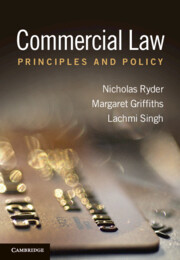Book contents
- Frontmatter
- Contents
- Preface
- List of abbreviations
- Table of Statutory Provisions
- Table of Cases
- Part 1 Agency
- Part 2 Sale of Goods and Services
- Part 2 Chapter 1 Sale of Goods Policy
- Part 2 Chapter 2 The Implied Conditions in Sale of Goods Contracts
- Part 2 Chapter 3 The Passage of Title, Delivery and Payment
- Part 2 Chapter 4 The Supply of Goods and Services
- Part 2 Chapter 5 E-commerce and Distance Selling
- Part 3 International Trade and Sales
- Part 4 Tortious Liability for Defective Products
- Part 5 Unfair Commercial Practices
- Part 6 Banking and Finance Law
- Part 7 Consumer Credit
- Bibliography
- Index
- References
Part 2 Chapter 2 - The Implied Conditions in Sale of Goods Contracts
from Part 2 - Sale of Goods and Services
Published online by Cambridge University Press: 05 August 2012
- Frontmatter
- Contents
- Preface
- List of abbreviations
- Table of Statutory Provisions
- Table of Cases
- Part 1 Agency
- Part 2 Sale of Goods and Services
- Part 2 Chapter 1 Sale of Goods Policy
- Part 2 Chapter 2 The Implied Conditions in Sale of Goods Contracts
- Part 2 Chapter 3 The Passage of Title, Delivery and Payment
- Part 2 Chapter 4 The Supply of Goods and Services
- Part 2 Chapter 5 E-commerce and Distance Selling
- Part 3 International Trade and Sales
- Part 4 Tortious Liability for Defective Products
- Part 5 Unfair Commercial Practices
- Part 6 Banking and Finance Law
- Part 7 Consumer Credit
- Bibliography
- Index
- References
Summary
Introduction
This chapter looks in detail at the implied conditions in the law governing the sale of goods which are of equal importance whether the purchaser is a business or a consumer. As such, they are an extremely important aspect of both commercial contracts and consumer contracts, although there are differences between the two, the significance of which will become apparent from the discussion below.
Section 2 looks at the background to sections 12–15 of the Sale of Goods Act 1979 and considers some of the differences in the impact of the provisions dependent upon the nature of both seller and buyer.
Section 3 analyses the implied condition as to the right to sell contained in section 12 of the 1979 Act and considers the section 12(1) implied condition and the section 12(2) implied warranties.
Section 4 deals with the implied condition that requires that goods that are sold by description must comply with that contractual description, and considers the ambit of the condition; what constitutes a ‘sale by description’; compliance with description and the relationship between section 13 and section 14.
Section 5 analyses the most well-known of the implied conditions, namely, that goods supplied under a sale of goods contract must be of a satisfactory quality. The section breaks down the analysis of this topic as follows: sale in the course of a business; merchantable quality; the introduction of ‘satisfactory quality’; the statutory exceptions to the requirement for satisfactory quality; the goods included in the requirement for satisfactory quality; the meaning of satisfactory quality; and the section 14(2B) criteria.
- Type
- Chapter
- Information
- Commercial LawPrinciples and Policy, pp. 78 - 113Publisher: Cambridge University PressPrint publication year: 2012



